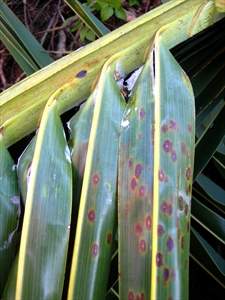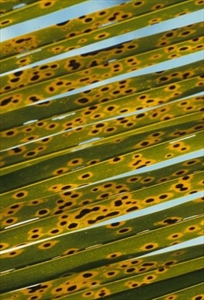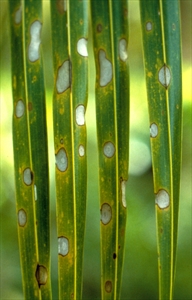- Widespread distribution. Two leafspots: brown leaf spot (BLS) - Pseudoepicoccum widespread in the tropics ; and grey leaf spot (GLS) - Pestalotiopsis in Southeast Asia, Africa, Caribbean, Oceania. Both occur on coconut, betel nut, oil palm. Fungal diseases of low importance.
- BLS – oval spots, up to 10 mm long with grey centres and brown margins. Black powdery spores mass below. GLS – grey with thin brown border and tiny black dots containing the spores.
- Spread in wind and rain. Worse on older leaves.
- Cultural control: improve nutrition (diseases are a sign of poor growing conditions); decrease shade in nursery.
- Chemical control: none recommended as treatments would likely be uneconomic.
Pacific Pests, Pathogens and Weeds - Online edition
Pacific Pests, Pathogens, Weeds & Pesticides
Coconut leaf spots (090)
Brown leaf spot and grey leaf spot
Pseudoepicoccum cocos (brown leaf spot); Pestalotiopsis palmarum (grey leaf spot).
AUTHORS Helen Tsatsia & Grahame Jackson
Information from McKenzie E (2013) Pseudoepicoccum cocos: PaDIL - http://www.padil.gov.au. Photos 2&3 Kohler F, et al. (1997) Diseases of cultivated crops in Pacific Island countries. South Pacific Commission. Pirie Printers Pty Limited, Canberra, Australia.
Produced with support from the Australian Centre for International Agricultural Research under project PC/2010/090: Strengthening integrated crop management research in the Pacific Islands in support of sustainable intensification of high-value crop production, implemented by the University of Queensland and the Secretariat of the Pacific Community.






